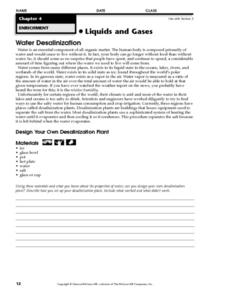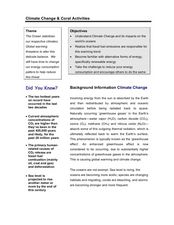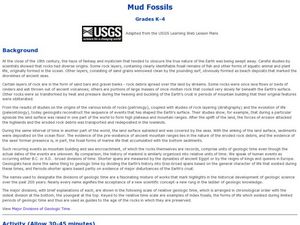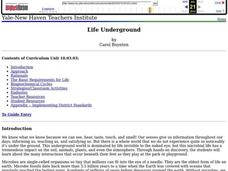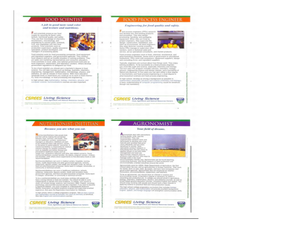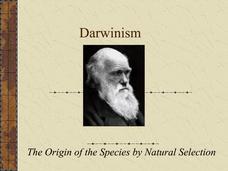Curated OER
The Caspian Sea
In this comprehension and geography worksheet, students read an article about the Caspian Sea, identifying where it is located and what countries surround it. Then they describe three parts of the sea, what are tributaries, and how many...
Curated OER
Water Desalinization
In this water desalinization worksheet, students will design and construct their own desalinization plant. Then they will describe how they set up their experiment and if it worked or not.
Curated OER
Climate Change & Coral Activities
Learners study how the ocean stabilizes our planet's climates and how global warming is becoming a threat to this fine balance. In this climate change lesson plan, students identify that fossil fuel emissions are responsible for global...
Curated OER
Mapping the Middle East
Students examine how the countries of the Middle East were created. They explore the influence of various political and geographic factors in their creation. They list the things they should consider in deciding how to draw new borders...
Curated OER
Meet the Corals
Students investigate the types of coral. For this oceanography lesson, students access the Fisheye View Cam Website and create their own coral garden by using various art supplies.
Curated OER
Mud Fossils
Learners observe real fossils. In this science lesson, students make their own mud fossils by pressing material into the mud and letting it dry in the sun for 3-4 days. Learners then get the fossils out displaying their mud fossils.
Curated OER
Air and Water in the Environment
Students demonstrate an awareness of air as a substance that surrounds us and takes up space, and whose movement we feel as wind. They predict and describe how local weather conditions affect living things, including themselves.
Curated OER
Middle East Related
Eighth graders find a current event related to the Middle East. In this current event lesson students write a brief summary of a new story related to the Middle East. They give their opinion and tell how it affects their life or who it...
Curated OER
WHO Wants Clean Water! Do You? Solving Conflicts Over International Water Rights Issues
High schoolers examine the water rights on an international scale. In this social studies lesson, students research on a specific water rights issue. They write a paper about their findings and create a PowerPoint presentation which they...
Curated OER
Yo-ho, Yo-ho a Viking's Life for Me
Students complete a unit of lessons on the Vikings. They analyze maps, read and discuss myths, summarize the main ideas from resource materials, watch videos, sing a song, draw a picture to illustrate Norse mythology, and define key...
Curated OER
Lesson 4: Fighting for Peace: The Fate of Wilson's Fourteen Points
Learners analyze foreign policy. For this Fourteen Points lesson, students examine Wilson's Fourteen Points, explore Allied reaction to the Points, and compare Wilson's foreign policy to the Versailles Treaty.
Curated OER
Early Explorers
Fifth graders investigate the routes taken by the early explorers. In this explorers lesson, 5th graders use interactive notebooks, discussion and maps to discover the routes taken. Students get into pairs and label maps, and create...
Curated OER
Life Underground
First graders build a terrarium in order to observe animal and plant life dynamics. In this biology lesson, 1st graders compare how organisms survive in different environments. They write their observations and analysis in their journal.
Curated OER
Exploring Plate Tectonics
In this plate tectonics worksheet, students answer questions about plate movement, the types of boundaries, the history of Earth's crusts and plate tectonics. They use an on line source to get their answers.
Curated OER
Geographic Features and Human Settlements
Third graders examine geography and settlements. In this geography lesson, 3rd graders participate in classroom activities that center on the idea that people settle where there are geographical features that sustain life.
Curated OER
How much is Dirt Worth?
Students problem solve to understand the value of the Earth's soil. In this value of dirt lesson, students understand how much of Earth is made of dirt and how important to our survival it is.
Curated OER
Michigan Food: From Farm to You
Students recognize Michigan on a map and understand how its climate is affected by the Great Lakes. In this Michigan food lesson, students play a trivia game to identify the produce of Michigan. Students relate the climate in each part...
Curated OER
Sea Ice: Unscrambling the Egg Code
Students determine sea ice thickness, concentration, and floe size by reading egg codes. In this sea ice conditions lesson plan, students color code a map based on prescribed criteria and use the maps to identify changes in sea ice...
Curated OER
Aquatic Ecosystems
Students study the diversity of marine life and their habitats. In this aquatic ecosystems instructional activity students complete a lab activity and experiment.
Curated OER
Darwinism: The Origin of the Species by Natural Selection.
The Darwin PowerPoint covers many of the Scientists that worked on similar concepts to Darwin and that were involved with famous theories. students are informed about the basic thinking behind natural selection and examples of...
Curated OER
Rolling Around the Continents
Students practice throwing skills by rolling a ball at a target, and practice the location of the seven continents, the equator, and the northern and southern hemispheres.
Curated OER
Global Warming: Life in a Greenhouse
Students investigate the evidence and consequences of global warming. They read and discuss an article, conduct a debate, evaluate their community's climate statistics, log their gas consumption for a week, and develop a panel discussion...
Curated OER
Border to Border
Students use the Internet to gather information on the country of Mexico. They also discover the culture of their people and compare them with the United States population. They take a virtual tour of some of Mexico's most historical ruins.
Curated OER
Tracking Narwhals in Greenland The Ocean Unicorn
Students study the ecology, habitats, geographic range and feeding habits of narwhals. They determine at least three reasons for the decline in the narwhal populations and complete the accompanying worksheets.



